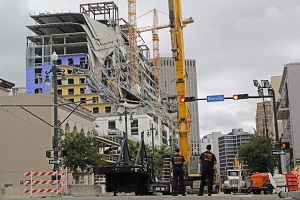 Wednesday, April 17, 2024
Wednesday, April 17, 2024  Wednesday, April 17, 2024
Wednesday, April 17, 2024 
The sight of the collapsed Hard Rock Hotel is impossible to escape on the busy Canal Street corridor downtown. Slabs of broken gray concrete form a frozen landslide 18 stories above the ground, and the arm of a massive crane stands almost upright after a botched removal effort left it embedded in the sidewalk below.
Nearly three months after the deadly collapse, the bodies of two victims – José Ponce Arreola, from Mexico, and Quinnyon Wimberly, from New Orleans – still remain inside the wreckage.
After Delmer Joel Ramírez Palma was deported just days after Thanksgiving, the Hard Rock ruins serve as a stunning visual reminder of the precarious situation of undocumented workers who hold a unique place in the history of post-Hurricane Katrina New Orleans. Having helped rebuild New Orleans and much of the surrounding region after the hurricane, they now face being hounded out of the place many of them call home.
Ramírez Palma, an undocumented construction worker at the Hard Rock, had tried to warn supervisors of construction safety concerns but was ordered to ignore the issues, according to his lawyers and family. Two days after being seriously injured in the collapse, he was detained by Immigration and Customs Enforcement (Ice) and subsequently deported to Honduras, against the protests of immigration advocates and the head of a state labor agency. He had lived in New Orleans for 18 years.
For many New Orleanians, the treatment of Ramírez Palma was both a stinging rebuff to the contributions of undocumented immigrants in New Orleans over the years, and yet another example in a long history of Latinx worker abuse in the city.